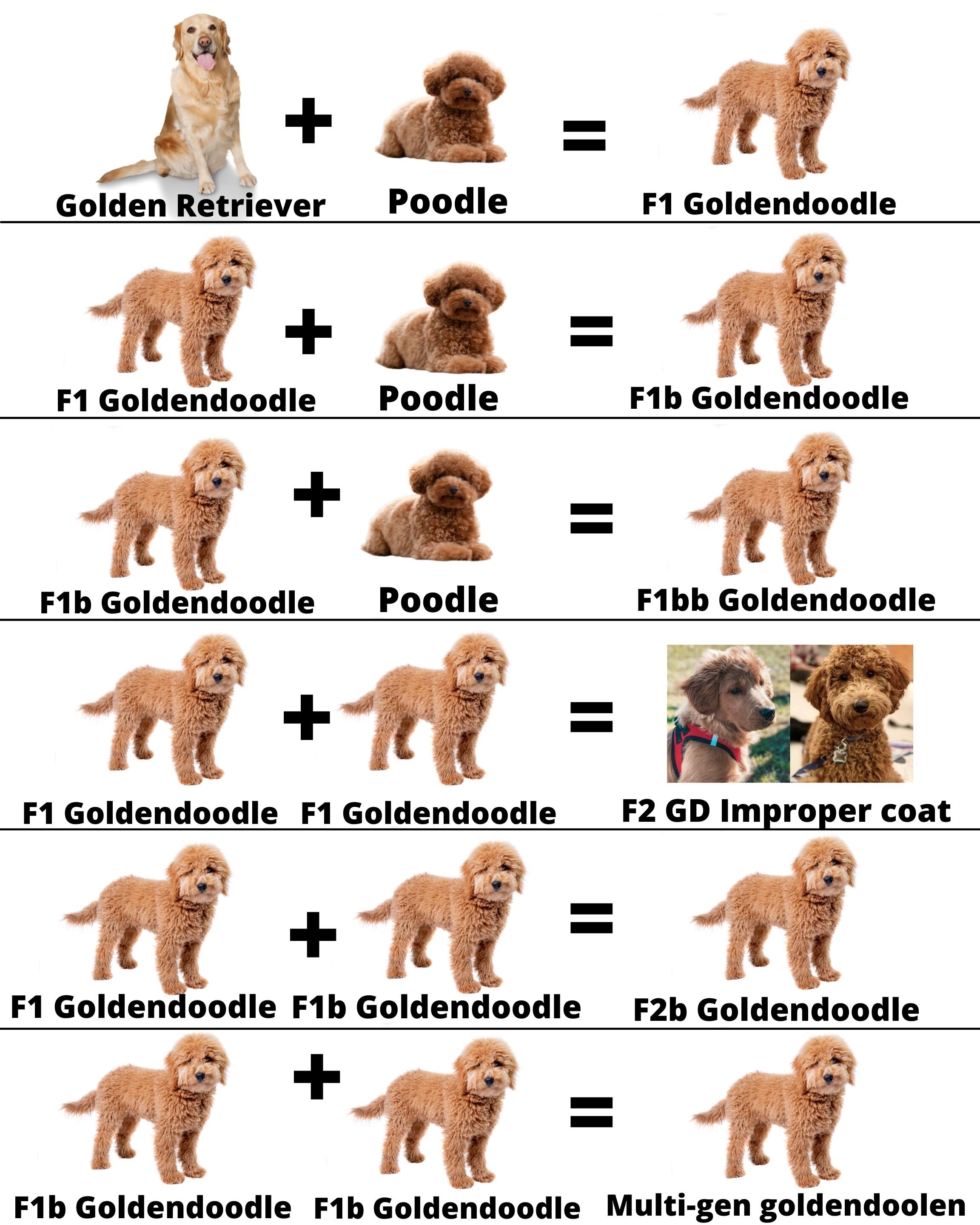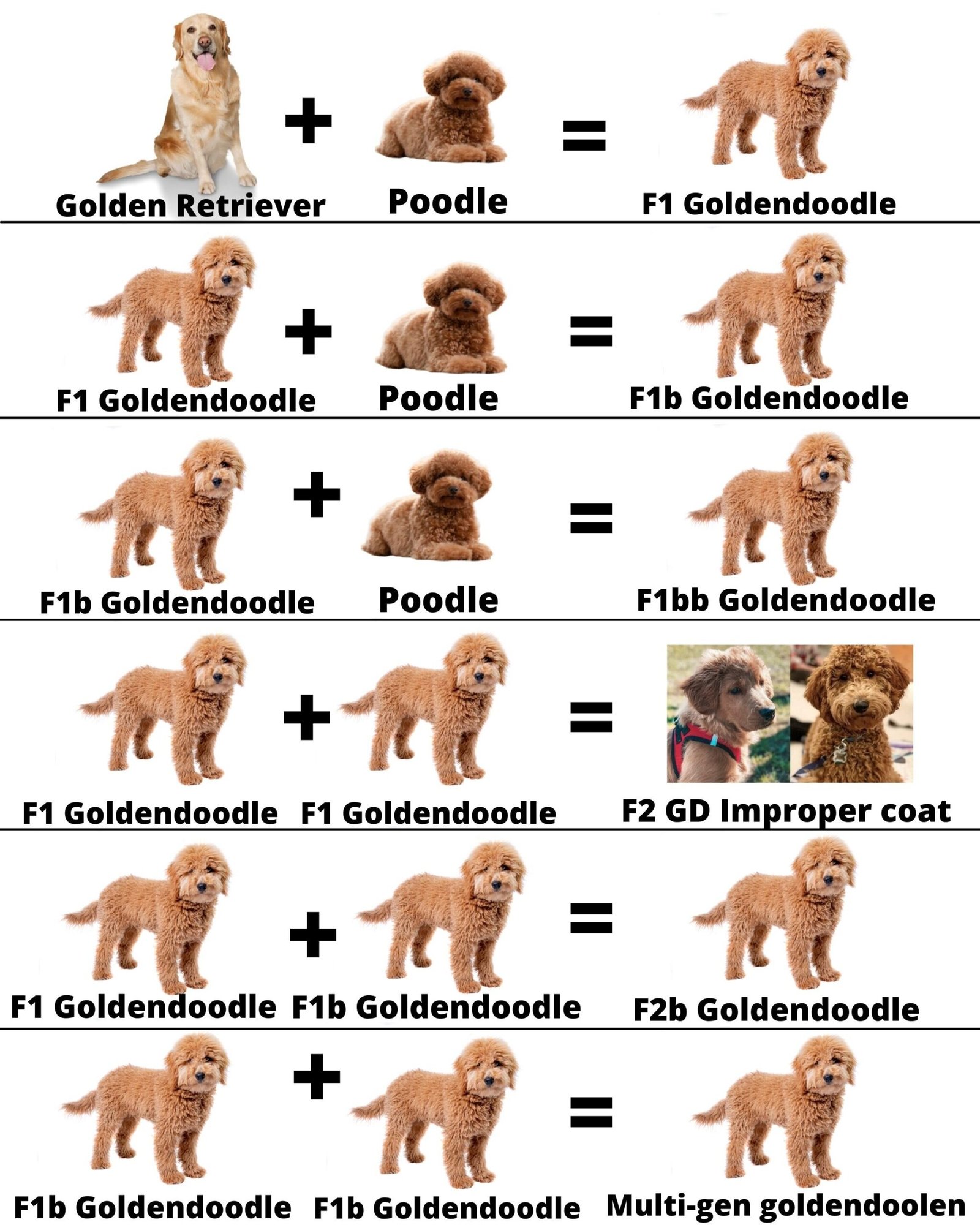When it comes to breeding a goldendoodle, the options can seem endless. But can you breed an f1b goldendoodle with a poodle? The answer might surprise you. While both breeds share common traits such as being intelligent, friendly, and hypoallergenic, the f1b goldendoodle is a second-generation cross between a poodle and a golden retriever, whereas a poodle is its own distinct breed. So, what happens when you cross these two? Let’s explore further.
When it comes to breeding an f1b goldendoodle with a poodle, there are several factors to consider. First, let’s delve into the history. The goldendoodle breed was first introduced in the 1990s as a result of the desire for a friendly and hypoallergenic dog with low shedding. By crossing a golden retriever with a standard poodle, breeders were able to achieve this ideal mix. However, breeding an f1b goldendoodle with a poodle introduces more poodle genetics into the mix, resulting in a dog that is closer to a poodle in terms of appearance and traits. This can lead to variations in coat type, size, and temperament, depending on the specific characteristics of the parent dogs involved.
While technically possible, breeding an F1B Goldendoodle with a Poodle is not recommended. F1B Goldendoodles are a cross between a Goldendoodle and a Poodle, while Poodles are purebred dogs. Breeding these two together can result in unpredictable traits and variations in coat type, size, and temperament. It is generally best to breed Goldendoodles with Goldendoodles or Poodles with Poodles for more consistent outcomes.

Is it Possible to Breed an F1B Goldendoodle with a Poodle?
When it comes to breeding dogs, there are often questions about what combinations are possible and what the resulting offspring will be like. One popular crossbreed is the Goldendoodle, which is a mix between a Golden Retriever and a Poodle. But can you breed an F1B Goldendoodle with a Poodle? Let’s explore the possibilities and considerations of this breeding combination.
Before diving into the specifics of breeding an F1B Goldendoodle with a Poodle, it’s essential to understand what these terms mean. An F1B Goldendoodle is a first-generation Goldendoodle crossed with a purebred Poodle. This results in puppies that are 75% Poodle and 25% Golden Retriever. On the other hand, a Poodle is a purebred dog belonging to the Poodle breed.
Now, let’s explore the possibilities and considerations of breeding an F1B Goldendoodle with a Poodle.
Suitability for Breeding
When considering breeding an F1B Goldendoodle with a Poodle, it is important to assess the suitability of the parents. Both dogs should be healthy, free from genetic disorders, and have suitable temperaments. Breeding should only be considered if the dogs meet these requirements.
Health Considerations
Both the F1B Goldendoodle and the Poodle should undergo thorough health testing to ensure they are free from any hereditary conditions that could be passed on to their offspring. This may include tests for hip dysplasia, eye disorders, and genetic diseases.
Additionally, it is important to consider any differences in health between the two breeds. Poodles are generally healthier than Golden Retrievers, so breeding an F1B Goldendoodle with a Poodle may produce healthier offspring with a reduced risk of genetic health issues.
Temperament Considerations
The temperament of both the F1B Goldendoodle and the Poodle should be evaluated before breeding. While both breeds are typically friendly, intelligent, and trainable, there may be differences in their specific temperaments. It is essential to ensure that both dogs have desirable temperaments that are well-suited for a family environment.
By carefully selecting healthy and compatible parents, you can increase the likelihood of producing offspring with desirable traits and characteristics.
Appearance of Offspring
When breeding an F1B Goldendoodle with a Poodle, the appearance of the offspring can vary. The F1B Goldendoodles have traits from both Golden Retrievers and Poodles, while Poodles have their distinct characteristics.
Coat Type and Color
The coat type and color of the offspring will depend on the specific genetic combination of the parents. Poodles generally have curly and hypoallergenic coats, while Golden Retrievers have wavy or straighter fur. The F1B Goldendoodles are more likely to have curly or wavy coats, but there can still be some variation within a litter.
The coat colors can also vary, with possibilities including cream, apricot, red, black, and various shades of brown. The specific coat color of the offspring will depend on the coat colors carried by the parents.
It’s important to note that the appearance of the offspring cannot be guaranteed, as genetics can be unpredictable. Each puppy in a litter may have slightly different coat types and colors.
Breeding Considerations
Before breeding an F1B Goldendoodle with a Poodle, there are several essential considerations to keep in mind:
- Ensure both dogs are in good health and have passed all required health tests.
- Evaluate the temperament of both dogs to ensure they are compatible.
- Consider the specific traits and characteristics of each breed and how they may present in the offspring.
- Consult with a veterinarian or professional breeder for guidance and advice.
- Understand the time, effort, and resources required for responsible breeding.
Conclusion
While it is possible to breed an F1B Goldendoodle with a Poodle, it is crucial to consider various factors such as the health, temperament, and appearance of both parents. Responsible breeding should always prioritize the well-being and welfare of the dogs and the resulting offspring.
Can You Breed an F1B Goldendoodle with a Poodle?
- Yes, you can breed an F1B Goldendoodle with a Poodle.
- An F1B Goldendoodle is a cross between a Poodle and an F1 Goldendoodle.
- This crossbreeding results in a dog that is about 75% Poodle and 25% Golden Retriever.
- By breeding an F1B Goldendoodle with a Poodle, you will have a higher percentage of Poodle genes in the offspring.
- This can result in a dog that has more hypoallergenic qualities, similar to a Poodle.
Frequently Asked Questions
Breeding goldendoodles and poodles is a common practice, but can you breed an F1B goldendoodle with a poodle? Here are some frequently asked questions to help you understand the breeding possibilities:
1. Can an F1B goldendoodle be bred with a poodle?
An F1B goldendoodle, which is a cross between a poodle and an F1 goldendoodle, can be bred with a poodle. The resulting puppies would be considered F2B goldendoodles. These puppies will have a greater chance of inheriting the poodle’s coat characteristics and hypoallergenic qualities.
The F2B goldendoodles are typically 75% poodle and 25% golden retriever. This mix brings forth a desirable combination of traits from both breeds, including intelligence, friendliness, and a low-shedding coat. However, it’s important to note that traits can vary between individual puppies even within the same litter.
2. What are the advantages of breeding an F1B goldendoodle with a poodle?
When an F1B goldendoodle is bred with a poodle, the resulting puppies are likely to have a higher probability of having a curly or wavy coat, which is more typical of poodles. This can be an advantage for individuals who prefer a low-shedding and hypoallergenic dog. Additionally, by introducing a poodle into the breeding mix, the puppies may inherit the poodle’s intelligence and trainability.
Furthermore, the F2B goldendoodles have a higher chance of having consistent coat characteristics across the litter compared to F1B goldendoodles. This predictability can be beneficial for breeders and potential owners who have specific preferences for the coat type and shedding level of their future dog.
3. What should be considered before breeding an F1B goldendoodle with a poodle?
Before breeding an F1B goldendoodle with a poodle, it’s crucial to consider the health and temperament of both parent dogs. It is recommended to conduct health screenings to ensure that there are no underlying genetic conditions that could be passed on to the puppies. Additionally, evaluating the temperament and behavior of both dogs is essential to produce well-rounded and balanced puppies.
It’s also important to have a thorough understanding of the breed standard for goldendoodles and poodles to ensure that the breeding pair meets these criteria. Breeding responsibly requires careful selection and planning to produce healthy, happy, and well-tempered puppies.
4. Are F2B goldendoodles suitable for families with allergies?
While F2B goldendoodles have a higher chance of inheriting the hypoallergenic qualities of the poodle, it’s important to remember that allergies can vary from person to person. Some individuals with mild allergies may still experience symptoms around F2B goldendoodles depending on their sensitivity to allergens such as dander and saliva.
If you have allergies or someone in your household does, it is advisable to spend time with F2B goldendoodles before committing to a puppy. This will help determine if the specific dog triggers any allergic reactions. Consulting with a breeder who specializes in breeding hypoallergenic dogs can also provide valuable insights and guidance.
5. Can you show F2B goldendoodles in dog shows?
As of now, F2B goldendoodles are not recognized by major kennel clubs as a distinct breed for participation in conformation dog shows. These shows typically feature specific breed standards and evaluations. However, there are alternative dog events and activities such as obedience trials, agility competitions, and therapy work where F2B goldendoodles can showcase their skills and abilities.
It’s worth noting that breed recognition and participation in conformation shows can evolve over time. As the popularity and demand for goldendoodles continue to grow, there may be changes in breed recognition and acceptance in the future.

Yes, you can breed an F1B Goldendoodle with a Poodle. In fact, an F1B Goldendoodle is the result of breeding a first-generation Goldendoodle (F1) with a Poodle.
An F1B Goldendoodle has a higher percentage of Poodle genetics, which means they are more likely to have the desired hypoallergenic and non-shedding coat. This makes them a great choice for individuals with allergies or those who prefer minimal shedding.
